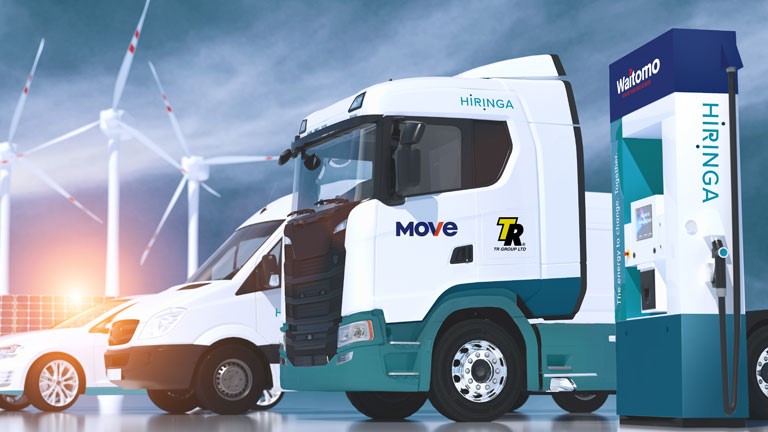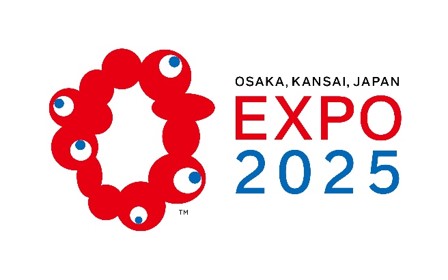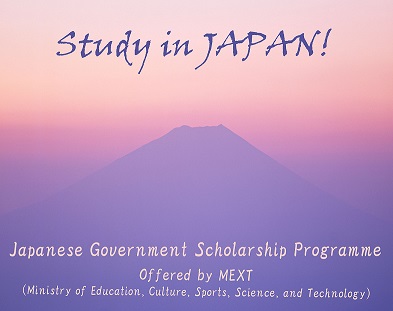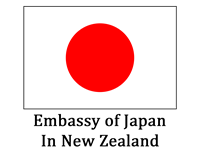Our 70th year milestone and
beyond;
Japan and New Zealand's Close Ties and Collaboration
May 2022
Ambassador Ito's message
 Welcome to our special webpage celebrating the 70th
anniversary of the establishment of Japan-New Zealand diplomatic relations.
Welcome to our special webpage celebrating the 70th
anniversary of the establishment of Japan-New Zealand diplomatic relations.
Our diplomatic relations date back to 1952, and since then our two countries have nurtured a very close and friendly relationship. To celebrate this anniversary, we have some exciting events planned: the Japan Festival in June, and the Yokai Parade (see below) in the winter.
Japan and New Zealand have achieved many things during the history of our bilateral relations. Not only do Japan and New Zealand share values such as democracy and the rule of law, we are partners striving to promote a free and open Indo Pacific, through cooperation in the fields of security and development - particularly in the Pacific, under what we call “Strategic Cooperative Partnership”. Economically, Japan is New Zealand’s 4th largest trade partner, and we are both forerunners of free trade, leading agreements like CPTPP and RCEP. Together, we are tackling climate change and are pursuing sustainable growth through innovative business activities, such as those described below. We have been witnessing very lively people to people exchanges, as evidenced by the largest number of sister city relations in the world and the popular JET Programme, through which more than 3200 Kiwis have lived in Japan.
On the invasion of Ukraine by Russia, Japan and New Zealand are working closely with the international community including the UN, and are making every effort to stop the aggression. As concurred in Japan-New Zealand Foreign Ministers Tele-conference meeting on 15th February, we support the territorial integrity and sovereignty of Ukraine. The invasion by Russia is a unilateral change of the status quo by force, which shakes the international order, but we stand united and in solidarity with the people of Ukraine who are bravely opposing the unjustified and unprovoked attack.
What we can show here is a mere fraction of the rich and wide-ranging Japan-New Zealand relationship, and I am confident that relations between our two countries will become even stronger in this memorial year. I hope you find this page informative and join us in celebrating our long-lasting friendship.
22nd March 2022
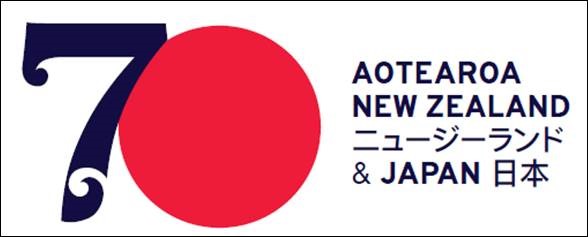
© MFAT
Recent Updates from the Embassy
Prime Minister Jacinda Ardern’s visit to Japan
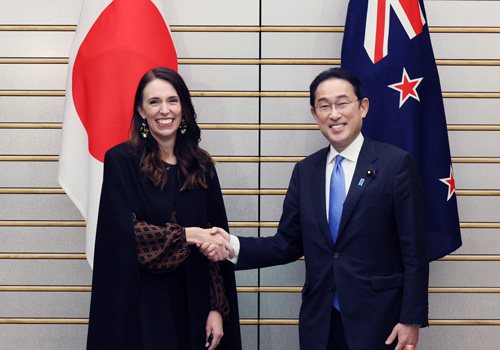
(Photo: Cabinet Public Affairs Office)
On 21st April 2022, Prime Minister KISHIDA Fumio and Prime Minister Jacinda Ardern held a summit meeting, and agreed upon strengthening our Strategic Cooperative Partnership to realise free and open Indo-Pacific. In the context of bilateral relations, the two leaders discussed various issues including cooperation in the economic field and in the Pacific, and agreed to launch formal negotiations for a Japan-New Zealand information security agreement. They also exchanged views on their collaboration in the international arena such as the response to Russia’s aggression against Ukraine and CPTPP.
Summary of Japan-NZ Summit Meeting
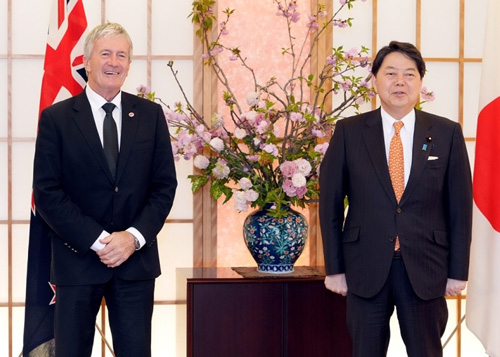
On 22nd April 2022, Foreign Minister HAYASHI Yoshimasa and Trade and Export Growth Minister Damien O’Connor met and the two ministers had a candid exchange of their views on CPTPP, reaffirming the importance of maintaining its high standard.
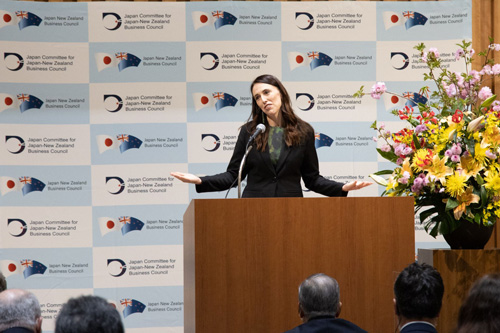
(Photo: NZ Embassy in Tokyo)
On 22nd April 2022, Prime Minister Jacinda Ardern delivered a speech entitled "New Zealand and Japan at 70 years: building a prosperous, sustainable future together". The event was hosted by the Japan-New Zealand Business Council, the Japan Chamber of Commerce and Industry, and the Tokyo Chamber of Commerce and Industry.
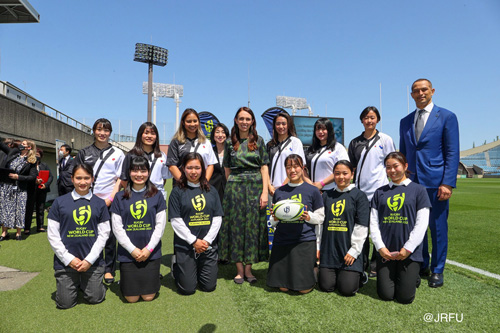
(Photo: Japan Rugby Football Union)
On 22nd April 2022, an event was held at Chichibunomiya Rugby Stadium in Tokyo to officially announce the relaunching of Game On English, and also to promote the Rugby World Cup 2021 (women’s tournament). Game On English originally started in 2014 during Former Prime Minister Abe Shinzo’s visit to Auckland, with the aim of offering a great opportunity for young Japanese students to stay in New Zealand for about three weeks to develop their English and rugby skills. The programme had been suspended due to COVID-19, but in 2022, by the New Zealand Government’s initiative, it will be resumed with a new cohort of young women travelling to Hamilton.
The Rugby World Cup 2021 will be held in Auckland and Northland between October and November in 2022. We hope the friendship between Japan and New Zealand will be further encouraged through these rugby exchanges.
Climate Change response
Key principles to meet the target
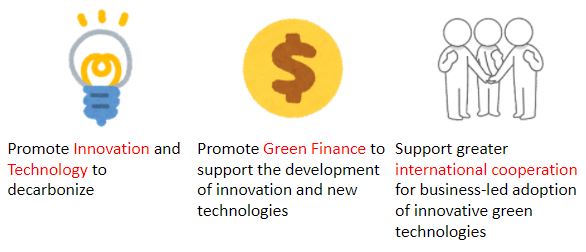
Japan’s Roadmap to Beyond ZERO Carbon (Ministry of Economy, Trade and Industry)
Key areas for Japan
- Hydrogen usage, storing, transporting and producing
- Automotive electrification and competitive battery storage
- Carbon recycling
- Offshore wind power generation
- Digital transformation, while supporting an information and communications infrastructure that underpins digitization and electrification
- Promote ammonia fuel use
- Improve the thermal and energy efficiency of new houses and buildings further and develop medium and large wooden buildings
- Step up reduce, reuse, and recycle initiatives, and separate, store, and effectively use greenhouse gasses from waste treatment
- Establish a sustainable food system
- etc.
Contribution to tackle climate change internationally
Climate Finance
✔ These commitments stand out as a sizeable amount among other developed
countries.
Developed countries are required to be collectively committed to the 100 billion USD per year for developing countries to meet their targets under the Paris Agreement)
- to 2020, provide approximately 12 billion USD per year, both in public and private finance
- from 2021 to 2025, provide the same high level of its previous commitment and prepare to provide up to 10 billion USD additionally in total, furthermore doubling assistance for adaptation to climate change to approximately 14.8 billion USD, both in public and private finance
Green Climate Fund
✔ Up to 3.0 billion USD in total to 2023
✔ 2nd Biggest pledge next to the UK
A fund for supporting a reduction of greenhouse gases (mitigation) and addressing impacts of climate change (adaptation) in developing countries)
- up to 3.0 billion USD in total to 2023
Joint Crediting Mechanism
A system to cooperate with developing countries to reduce greenhouse gas emissions, in which the result of the reduction is assessed as a contribution by both partner countries and Japan
- Japan has established the JCM with 17 developing countries since 2011.
Bilateral support
Support to developing countries in Asia, Africa and others; development of policies for building a low-carbon and decarbonized society, development of basic infrastructure in the energy sector including renewable energy and disaster prevention, development of human resources.
Working together with New Zealand
Japan has a longstanding economic partnership with New Zealand. Japanese businesses and their New Zealand business partners have worked closely together in the primary industries and other areas. In recent years, their efforts have been invigorated by new business areas, such as tackling climate change and pursuing sustainable growth. Here are some examples of these efforts.
HALCYON POWER LIMITED
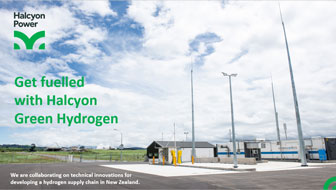
Halcyon is a joint venture between Taupo-based Tuaropaki Trust and Japanese leading constructor Obayashi Corporation.
We have developed a green hydrogen production and supply facility and are collaborating on technical innovations which will be key for a hydrogen supply chain in New Zealand.
Our green hydrogen plant uses the latest electrolysis technology to separate water into hydrogen and oxygen. Because it uses electricity generated by Tuaropaki Power Company’s geothermal power station, we can claim near zero carbon emissions in terms of production and that the fuel we provide for hydrogen vehicles will produce zero operating emissions.
Halcyon believes that hydrogen has a significant role to play in reducing greenhouse gas emissions in Aotearoa/New Zealand. We are also hoping that the experience and expertise acquired through this hydrogen venture will contribute to Japan’s vision to build a hydrogen society.
MITSUI & CO NZ Limited
Green Hydrogen Refuelling station business for fuel cell powered heavy vehicles in New Zealand
Mitsui & Co. has become a strategic investor in Hiringa Refuelling New Zealand Limited ("HRNZ") to develop a network of green hydrogen refuelling stations for fuel cell powered heavy vehicles in New Zealand in Sep 2021.
HRNZ plans to build four fuel stations within 2022, located in logistics hubs in major cities targeting the country's commercial and heavy transport market.
New Zealand has abundant sources of renewable energy from which to produce green hydrogen, and approximately 85% of its electricity now comes from renewables. There is also collaboration between the governments of Japan and New Zealand, which have signed a Memorandum of Cooperation on hydrogen.
We look forward to working with Hiringa to create a sustainable 'local production for local consumption' green hydrogen business to address the urgent and complex global challenge of climate change. Click here (PDF)
Toyota NZ's efforts to Decarbonise
For Toyota in New Zealand, Hydrogen is expected to play an increasing decarbonisation role as nations move away from fossil fuels in a bid to reduce carbon emissions.
To support a decarbonised economy, Toyota is taking a diversified approach. Hydrogen is one of the solutions to reduce our reliance on fossil fuels in general as a country not just in the transport sector.
We are not limiting ourselves to thinking about just mobility solutions. We are talking and collaborating with other like-minded organisations on the possibilities of hydrogen in a wide range of situations – from replacing portable diesel generators to providing energy for homes.
We have strong support from Toyota Motor Corporation to explore a variety of commercial partnerships to advance hydrogen technology in New Zealand.
Already we are supporting our long-term partners, Emirates Team New Zealand by supplying them the hydrogen fuel cell technology for their Chase Zero boat. Additionally, we have partnered with eight Auckland-based Kiwi brands to demonstrate the possibilities of corporate car share and hydrogen technology through sharing four Toyota Mirai's.
We see Toyota as a catalyst and accelerator for further hydrogen development in New Zealand through bringing the technology here as an enabler.
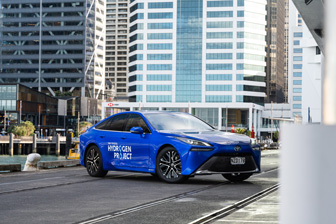
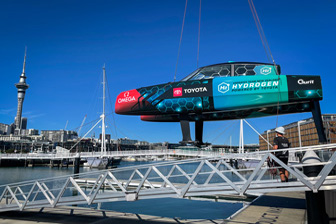
JUKEN NEW ZEALAND LIMITED
Juken New Zealand Ltd (JNL), a subsidiary of Japan-based parent company WoodOne Ltd, aspires to the global challenge to reduce the effects of climate change.
Our sustainably managed and certified plantation forests in the East Coast and Wairarapa regions help to address climate change by reducing the amount of greenhouse gases in the atmosphere.
In those same locations and Kaitaia, we have four modern, efficient and environmentally clean wood processing mills that provide premium wood solutions for commercial and residential construction in New Zealand and abroad.
JNL uses all parts of the logs (clear sapwood, core wood and waste wood) in our premium wood solutions. One such product is Triboard made in Kaitaia. We take waste wood materials and manufacture a reconstituted panel which continues to store carbon throughout its life cycle.
In an age where wood is becoming increasingly recognised as an effective and natural building material of choice to combat the global effects of climate change.
SUMITOMO FORESTRY GROUP

The Sumitomo Forestry Group engages upstream in sustainable forestry, midstream in
distribution and manufacturing operations, and downstream in housing related operations
both overseas and in Japan. The Group has established a vertically oriented business
centered on wood, and is in the process of expanding horizontally and linking various
locations around the world.
In New Zealand, Tasman Pine Forests Ltd, a plantation company which grows mainly radiate pine, and Nelson
Pine Industries Ltd, a wood processing company which produce MDF (Medium Density Fibreboard) and LVL
(Laminated Veneer Lumber) from radiata pine logs, has been operating. We would like to introduce the
contribution to the mitigation of global warming by highly integrated these two companies. Click here (PDF)![]() for more details.
for more details.
Events & Culture
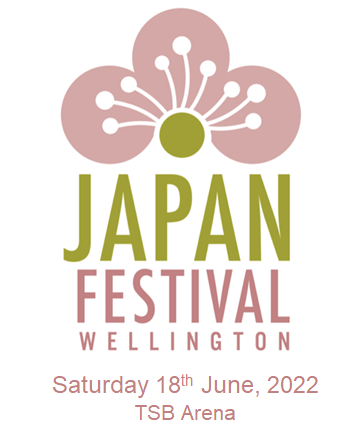
The Japan Festival Wellington is a large-scale Japanese cultural event attracting around 20,000 visitors, and has continued biennially for more than ten years. While showcasing various Japanese cultural attractions, including exquisite Japanese food, traditional music and amazing performances, the event has also provided networking opportunities for many people, including business professionals, across various areas.
This year we are working closely with the Japan Festival Trust (Organiser), along with the Wellington City Council, to make it larger and more fitting to celebrate 70 years of close diplomatic ties between Japan and New Zealand in 2022. The Festival is a great opportunity for everyone to experience the delights of Japan together!
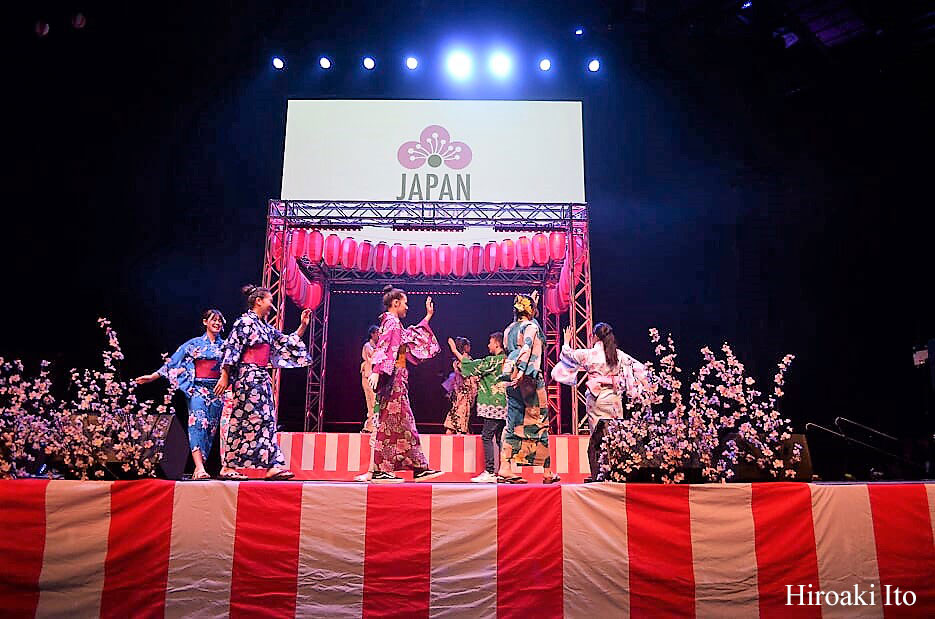
Japan Festival Wellington Website:
https://japanfestivalwellington.org/
Facebook:
https://www.facebook.com/JapanFestivalWellington/

Yokai Parade: Supernatural Monsters from Japan
Have you heard of Japanese yokai? Yokai are traditional supernatural monsters that have permeated every aspect of Japanese culture for hundreds of years through various media forms such as woodprints, children’s games, ghost stories and folktales, anime, and films. These unique, diverse characters and designs have captivated people with their spookiness and mysteriousness, as well as their friendliness and charm.
The Embassy is now preparing for various Yokai -related events, including the Yokai exhibition in August. People are sure to enjoy this unique spiritual world of Japanese aesthetic art. More details to come!
Exhibition leaflet
(PDF:9.27MB)![]()

The Japanese Film Festival is an in-person event showcasing different genres of Japanese films at movie screening venues across New Zealand. The event has continued for over ten years in different parts of New Zealand, including Wellington. The films, provided by the Japan Foundation, co-organiser of the festival, include a variety of genres such as human drama, comedy, history, and teenage romance among others, all of which offer New Zealand people the opportunity to enjoy Japanese film as an artform, while learning more about aspects of Japanese culture and values. More details are yet to be announced for this year. Enjoy the Japanese film with your family, whanau and friends!
Food & Sake
(Traditional Washoku” from YouTube “Prime minister’s Office of Japan Channel)
Japanese food is well known in New Zealand and other countries, but what distinguishes Japanese cuisine from others?
In December 2013, Japanese cuisine, “Washoku”, was registered as an UNESCO Intangible Cultural Heritage for being "Traditional Dietary Cultures of the Japanese". At that time, Washoku was defined as having four features:
- A rich variety of fresh ingredients, and respect for inherent flavours
- Nutritional balance that supports a healthy diet
- Expressions of the beauty of nature and changing seasons
- An intimate relationship with annual celebrations such as New Year
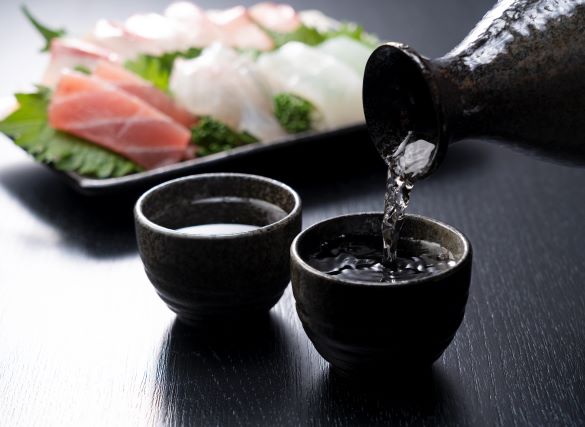
And sake is the best partner for Japanese food. Sake is brewed from rice and water using a combination of rice mould, yeast, and lactic acid bacterium fermentation. The rice and water used is usually locally sourced and the fermentation process is affected by the local microclimate. So much like the marriage of food and wine, sake is naturally the best partner for Japanese food.
You can find Japanese food, food products, and sake in many restaurants and supermarkets here in New Zealand, check them out!
- Appointment of Japanese Cuisine Goodwill Ambassadors in New Zealand
- Appointment of Japanese
Cuisine Goodwill Ambassador (Mr Kinji Hamada)

The World EXPO 2025 will be held in Osaka, Kansai, Japan.
It themed around “Designing Future Society for Our Lives”, and it put concept on “-People’s Living Lab- A laboratory for a future society”.
- A space where 8 billion people from around the world will not only view exhibits but will co-create our future society.
- Even before the Expo begins, an online platform for sharing challenges and solutions from around the world will be launched.
- A place where the world’s knowledge such as cutting-edge technology will be brought together, used to create new ideas, and shared, all to help resolve global issues facing mankind.
We think EXPO2025 will be a good occasion to show a sustainable future to everyone around the world.
We are looking forward to participation announcements from many countries and international organizations including New Zealand!
Schedule: 13 April – 13 October in 2025
Venue: Yumeshima, Osaka
- Introduction movie by Japan Association for the 2025 World Exposition
- Japan Association for the 2025 World Exposition website
- Confirmed Participants for
the
EXPO 2025
People-To-People Exchange
Sister Cities
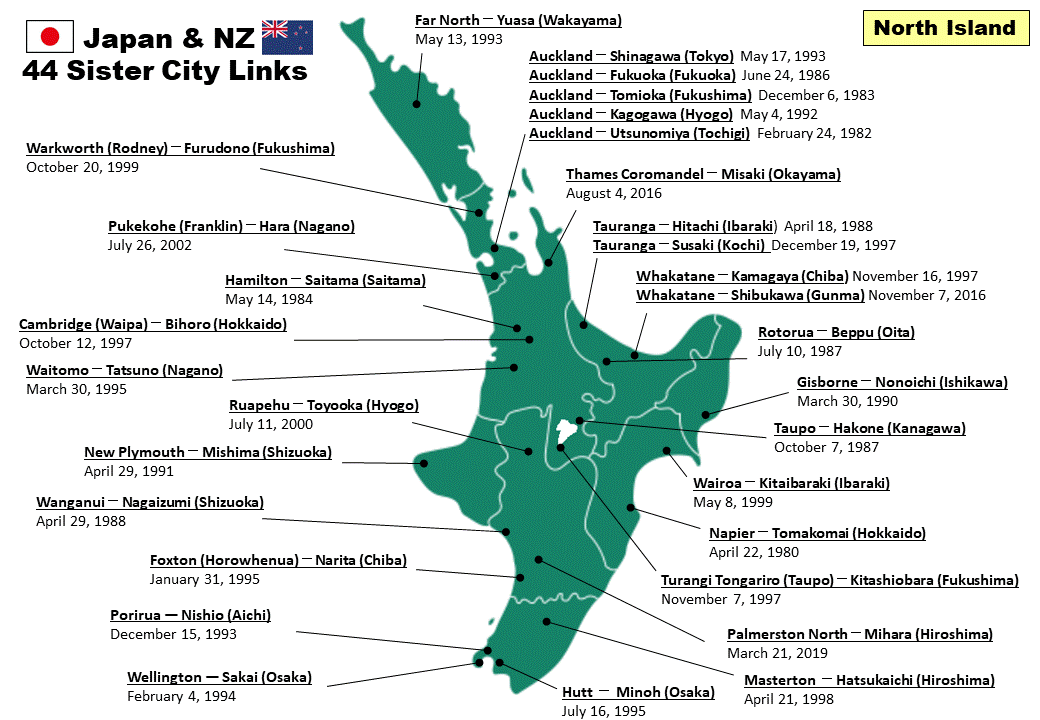
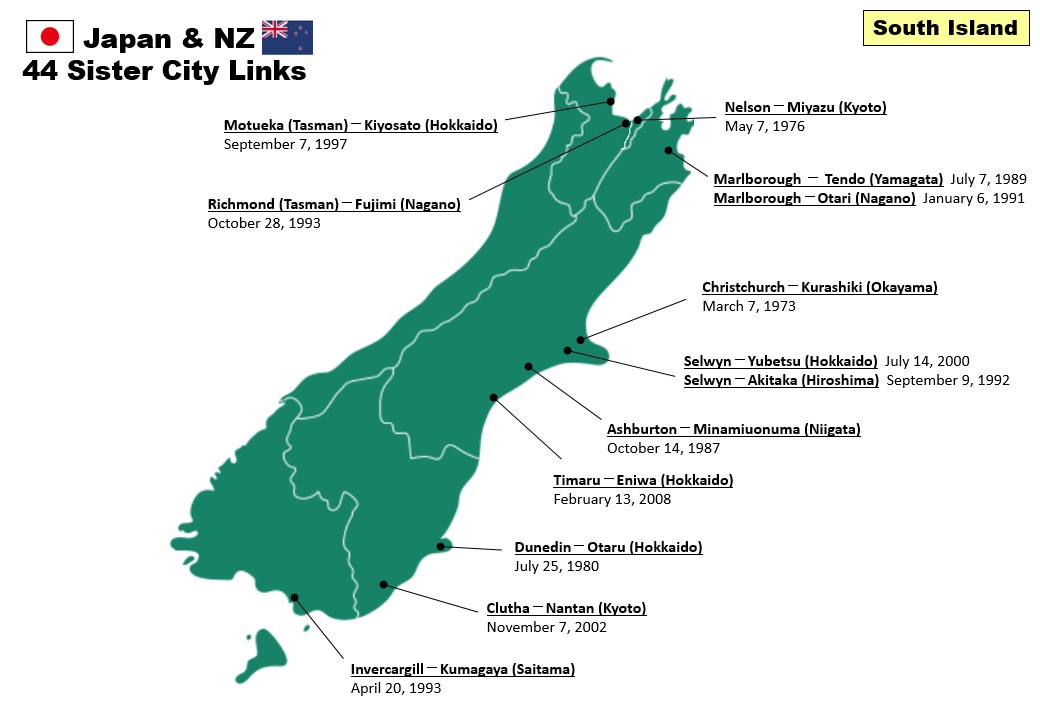
One of the key exchanges symbolic of people-to-people connections between Japan and New Zealand is our sister city relationships.
- Japan and New Zealand currently enjoy 44 sister city connections; the highest number that New Zealand has with any other country, followed by China (38), Australia (24), and United States (20).
- Our longest standing relationship is between Kurashiki in Okayama, and Christchurch, which will celebrate their 50-year anniversary in 2023. The newest one is between Mishima in Shizuoka, and New Plymouth.
- There have been robust activities in multiple fields including mutual visits, education, art and sports. Here are some recent examples:
- Wellington-Sakai Marathon
Exchange Celebration Dinner
 (November 19, 2021)
(November 19, 2021) - Wellington Potters’
Association
 (May 7, 2021)
(May 7, 2021) - Foreign Minister’s
Commendation Award Ceremony for Mr Ray Wallace, Chairman of Hutt Minoh House Friendship Trust
 (March 17, 2021)
(March 17, 2021)
Global Cities NZ (previously known as Sister Cities NZ) has been dedicated to supporting and promoting sister city relationships between Japan and New Zealand for decades.
- Sister Cities
New
Zealand 2021 Annual Conference
 (April 15-16, 2021)
(April 15-16, 2021)
JET Programme

The JET Programme is an exchange programme which has offered New Zealanders the opportunities to work in Japan either as Assistant Language Teachers (ALT) in schools, Coordinators for International Relations (CIR) at local municipalities, or Sports Exchange Advisors (SEA) to assist with sports training.
So far, 3,400 Kiwis have joined the Programme since its inception in 1987; the 5th highest number among all 75 participating countries (totaling 70,000 JETs) following the United States, the United Kingdom, Canada, and Australia.
In November 2021, 72 participants departed from New Zealand and began their respective roles.
JETs have served as a key role of bridging the cultural gap between Japan and New Zealand for many decades. Even after completing the Programme, many continue to contribute to the programme by joining the alumni association (JETAA) and engaging in various activities to pursue the deepening of the friendship between our two countries.
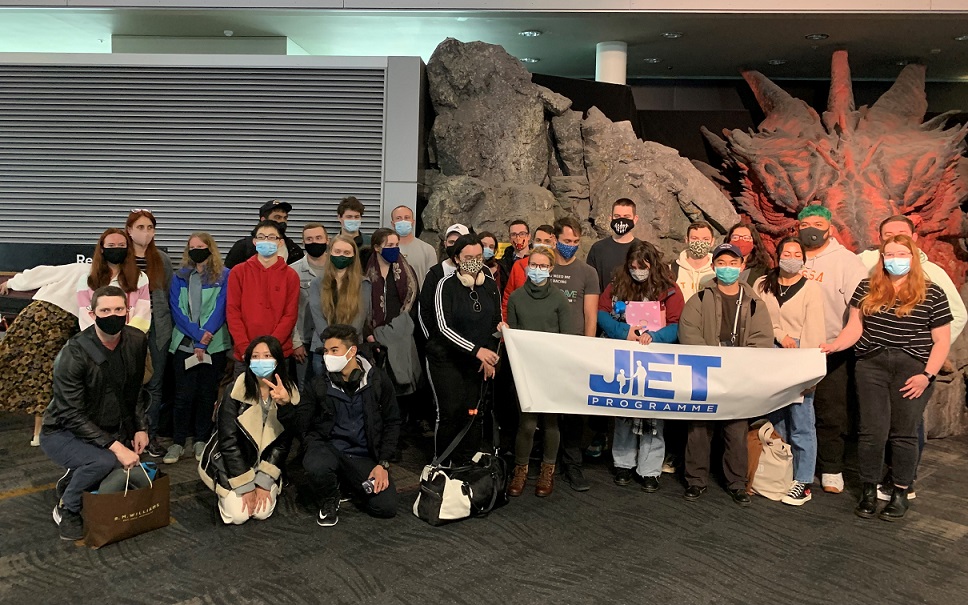
Related links:
Sports Exchange
1. Rugby-related
- The 2019 Rugby World Cup vitalised rugby’s popularity in Japan, and Prime Minister Jacinda Ardern’s exchange of rugby balls and uniforms with Prime Minister ABE Shinzo was a memorable moment for all in the lead up to the event.
- All Blacks superstars have played a key role in Japan’s professional teams, grabbing the attention of Japanese people. Beauden Barrett (The Blues), who played for Tokyo Suntory Sungoliath in 2021, has become popular in Japan. Now playing on the team is Damian McKenzie, who is famous for his trademark smile when goal kicking, and has become the most prolific scorer of the Japan Rugby League One’s inaugural season in 2022.
- Japanese professional rugby players have also made achievements in NZ rugby. Emeritus Professor SAKATA Yoshihiro, Japan’s former national team winger and Japan’s first World Rugby Hall of Famer, was named an Honorary Member of the New Zealand Order of Merit as part of the country's 2021 New Year Honours list. In recent years, Toyota Verblitz’s HIMENO Kazuki played for the Highlanders and was named Super Rugby Aotearoa Rookie of the Year in 2021.
- In April 2022, Prime Minister Jacinda Ardern officially announced the relaunching of Game On English during her visit to Japan. Game On English originally started in 2014 during Former Prime Minister Abe Shinzo’s visit to Auckland, with the aim of offering a great opportunity for young Japanese students to stay in New Zealand for about three weeks to develop their English and rugby skills. The programme had been suspended due to COVID-19, but in 2022, by the New Zealand Government’s initiative, it will be resumed with a new cohort of young women travelling to Hamilton.
- The Rugby World Cup 2021 will be held in Auckland and Northland between October and November in 2022. We hope the friendship between Japan and New Zealand will be further encouraged through these rugby exchanges.
2. The 2020 Tokyo Olympic and Paralympic Games
- The NZ Olympic team which participated in the 2020 Tokyo Olympic Games was the largest ever with 222 athletes.
- Japanese Host Towns (16 registrations) interacted with NZ athletes through training camps and various exchange activities and events.
(Maori song relay singing by Host Townsto cheer on NZ athletes)
Scholarship
Young New Zealand Scholars have been invited to study in Japan on fully funded scholarships since 1958. Over 250 scholars to date have studies in Japan towards undergarduate degrees, towards post-graduate degrees or qualification, or done a year abroad to learn about Japanese language and culture, midway through their university studies in their home university in New Zealand.
Scholars have then gone on to excel in their careers in both the public and private sectors, with previous recipients working in Government, representing New Zealand abroad in Diplomatic posts, working as lecturers or researchers in universities around the world, translating and interpreting, working in software, hardware or web development, and as lawyers, consultants and many other professions, among a huge variety of fields.
Tourism and Travel

Tourism between Japan and New Zealand has flourished in recent times, and we expect it will prosper once again after the decline brought on by restrictions due to the COVID-19 pandemic. We hope to see pre-COVID tourism numbers soon, once safe travel has been reinstated, Below are some statistics on the number of Japanese and New Zealand people travelling between our countries.
Travelers from Japan to New Zealand recorded roughly 100,000 between 2016 and 2019 on a yearly basis.
The number of travelers from New Zealand to Japan increased from about 56, 000 in 2006 to about 94,000 in 2019.
Youth exchange programme
JENESYS (Japan-East Asia Network of Exchange for Students and Youths) is a youth exchange programme which has continued since 2007, with the aim of deepening friendship and ties between promising youths of Japan and Asia Pacific countries, and to encourage the understanding of different aspects of Japan including politics, economics, history, and culture. In 2019, 175 people participated from New Zealand and other South Pacific nations. This year, due to COVID-19, the programme shifted to a virtual format with the participants experiencing a live virtual visit to Hiroshima Peace Memorial Park and the cultural practice of learning to do their own makeup with the methods and style of Kabuki actors, traditional Japanese stage performers, or ink-wash painting. It was such a great opportunity for the young students to broaden their perspectives, and we expect they will become key people in bridging the gap between Japan and New Zealand in the future.



